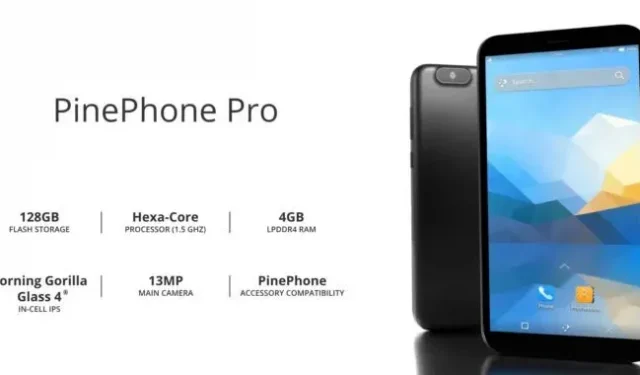PinePhone Pro updates hardware for Linux phone.

Pine64 is launching a major hardware upgrade in its quest to build a Linux smartphone. Following the launch of the original PinePhone in 2019, the organization is now accepting pre-orders for the PinePhone Pro, a new smartphone the company calls “the fastest mainstream Linux smartphone on the market.”The phone was announced in October and now you can secure your device. The MSRP is $599, but it’s available for pre-order now for a starting price of $399.
Because Pine64 wants to make an open-source Linux smartphone, its choice of hardware components is limited. Most major chip makers like Qualcomm or Samsung don’t want to share open drivers or circuits, and you saw this with the original PinePhone, which was based on Allwinner’s 40nm Cortex A53 SoC.
PinePhone Pro is updated with Rockchip RK3399 SoC. The chip is powered by two Cortex A72 processors and four Cortex A53 processors, and Pine64 says it worked with Rockchip to get the chip “locked and voltage locked for optimal performance with robust power and heat limits.”Pine64 does not list the technology node, but other companies list RK3399 at 28nm. If that’s true, and you’re looking for something roughly comparable in Qualcomm’s lineup, then the Snapdragon 618/650 (2016 mid-range chip) would seem to fit the bill.
The phone has a 6-inch 1440×720 LCD display, 4GB of RAM, 128GB of eMMC storage, and a 3,000mAh battery. There is a USB-C port with 15W charging, a headphone jack, a 13MP main camera and an 8MP front camera. The back cover is removable and inside the phone you’ll find a removable battery (wow!), a microSD slot, pogo contacts and a series of privacy DIP switches that allow you to disable tethering, Wi-Fi/Bluetooth, microphone, rear camera, front camera and headphones.
The pogo pins support a variety of clip-on backs that are compatible with both the original PinePhone and PinePhone Pro. For example, there is no built-in biometrics, but Pine64 sells a $25 backplate with a capacitive fingerprint reader. There is no wireless charging, but you can get a backplate that adds this feature for $10.
The wildest option is a $50 keyboard case with a 6,000 mAh battery. This turns the phone into a mini laptop with separate plastic keycaps that look like they have more travel than many laptop keyboards. The big downside to this changing back strategy is that you have to choose between options. For example, you can’t have wireless charging and a fingerprint scanner.
As for the software you’ll be using on this thing, that’s up to you. This is a phone for Linux enthusiasts who are ready to take on the challenge. It comes with Manjaro Arm and a Plasma Mobile interface, which Pine64 calls “pre-beta”. You really can’t be more honest than “who is this for?”disclaimer on the main page of PinePhone Pro stating:
Modern Linux mobile operating systems have a long way to go before they can be considered a true alternative to Android or iOS. While mobile Linux is not in a position to satisfy most mainstream electronics consumers, we recognize that a significant portion of our community is ready to move to a Linux-only smartphone today. The PinePhone Pro has enough power to be your daily driver if you’re willing to accept the current software limitations.
Pine64 says it will continue with the original PinePhone, which is still available for the very low price of $150. The Pro model will go on sale on January 24th.
Leave a Reply